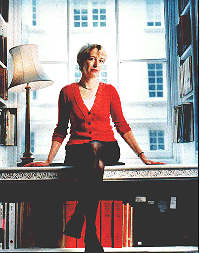Susan Greenfield
|
"Academics talk about dumbing down.If I saw me,I'd probably say 'She's sold sold out,' but I haven't" |
She's a workaholic dynamo who says she likes to do everything to excess
- except drugs, which literally blow your mind. The first female director
of the Royal Institution and presenter
of BBC2's Brain Story is a woman with a mission
- to explain the brain in a way that makes sense to everybody
 She is a whirlwind in everything - career, marriage,
eating, talking - bouncing ideas and metaphors with the care- free, but deadly,
insouciance of a kamikaze. She invites controversy as she strips mystique
and elitism from brain surgery to make it understandable to a lay public,
bewildered, as at no previous time, by rapid scientific developments that
are changing our lives. Dressed in a black Armani miniskirt, black stockings
and red sweater, looking a decade younger than her 49 years, the Oxford professor
in synaptic pharmacology has "darted round" to lunch a few yards from the
London office where she spends part of the week shaking up one of the world's
most venerable scientific research centres, the
Royal Institution. She is
its first woman director. "My dream is that of an evening people will say,
'What's on at the RI tonight?' rather than 'Let's go to the Roxy'." She orders
briskly. "I'm tempted by escargots with garlic, but my husband will
kill me, so I'll have soupe du poisson and filet of lotte with
mashed potato." She adds, "I've tried to slow down my talking. I'm impatient.
I hate waiting around. You know those personalities destined to have coronaries?
I'm one of them. I must be hyperactive. I have three people doing my diary
and correspondence."
She is a whirlwind in everything - career, marriage,
eating, talking - bouncing ideas and metaphors with the care- free, but deadly,
insouciance of a kamikaze. She invites controversy as she strips mystique
and elitism from brain surgery to make it understandable to a lay public,
bewildered, as at no previous time, by rapid scientific developments that
are changing our lives. Dressed in a black Armani miniskirt, black stockings
and red sweater, looking a decade younger than her 49 years, the Oxford professor
in synaptic pharmacology has "darted round" to lunch a few yards from the
London office where she spends part of the week shaking up one of the world's
most venerable scientific research centres, the
Royal Institution. She is
its first woman director. "My dream is that of an evening people will say,
'What's on at the RI tonight?' rather than 'Let's go to the Roxy'." She orders
briskly. "I'm tempted by escargots with garlic, but my husband will
kill me, so I'll have soupe du poisson and filet of lotte with
mashed potato." She adds, "I've tried to slow down my talking. I'm impatient.
I hate waiting around. You know those personalities destined to have coronaries?
I'm one of them. I must be hyperactive. I have three people doing my diary
and correspondence."
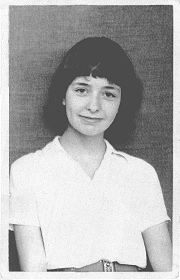 |
| By the age of 11,she was a star pupil. |
This is going to be an exhausting, but stimulating, couple
of hours with a woman who resents boundaries - she has posed for
Hello!, written 150 erudite scientific papers and uses her shapely
ankles and feet controversially to kick down the fusty barricades of scholastic
elitism. "Academics talk about 'dumbing down' and think you can't grubby
your hands in the real world. Colleagues may make derogatory remarks behind
my back, but none would say things to my face - that's the way of human beings.
If I saw me, I'd probably snipe at myself and say, 'She's sold out,' although
I haven't, and it's more intellectually challenging to make salient, complex
points sound simple."
She worries that there is a growing
philistinism, particularly among younger scientists who are too focused
on their CVs and frightened of being adventurous. "But that might be a problem
with all young people who no longer read classics or ask the big questions
of life. They feel they have to fight to survive in their careers, so they
toe the line, rather than being challenging and brave. To be heretical, I
don't know if we're doing better science than 30 years ago. I understand
what it's like to regard scientists as dysfunctional nerds, which is their
image, but they're just normal - neither cleverer, stupider nor less emotional
than anyone else - although they do sometimes like to make things obscure
and can have a monastic attitude, cherishing the idea that academics live
in ivory towers. Increasingly, though, the scientific community realises
we have to mesh with society - especially if we're raising issues of concern
which have real impact."
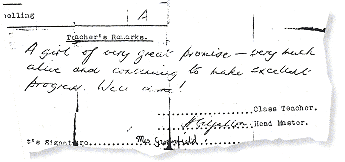 |
| Already,in 1960,her school report had highlighted her potential. |
Indeed, it is humbling to be told our most sensitive feelings
- religious, sexual, emotional - can be replicated by interfering with a
few neurons in the brain. "Some people
are frightened that when we understand the brain, we reduce it to atoms,
molecules and chemicals and lose the magic of all
we hold dear. I hope it's not offensive that we question religion,
for example. I try to sit on the fence and say if someone has a
religious experience, it can be matched by a
change in a certain part of the brain, so how do you know if it comes from
there or planet Zog? I don't personally believe in
God but don't say so in the series. I respect people's beliefs and
present them with facts, and because we can describe the brain in terms
of its components, it doesn't mean we're reducing it to those components.
We're saying they fit together like bricks to make a house, but how you build
the house is up to you.
"The brain is an exquisite, individual combination. sensitive
to environment. Certainly, we'll be able to stimulate bits of it, but you
can't target just sex, cooking ability or criminality. All those functions
are net products of the whole house. If you change one component, you alter
others. The potential could be frightening, but it's also exciting and if
viewers are informed, which is what I hope to do, they can assess it in the
right context. I want encourage debate about the questions and ethics
raised.
"I run my lab in a less confrontational way than men and when I deal with women,life is magically easier"
There is the vexed, perhaps politically incorrect suggestion,
observable by many married men, that the average brain, over a kilogram (around
2 1/2b) in weight with 100 billion cells, is different in women and men.
"If you and I put our brains on the table now, you wouldn't know which was
male and which was female. But if you took a large number, you'd notice that
the connections between the two hemispheres are on average denser in women.
Some people think that means women find it easier to multitask [she hasn't,
I notice smugly, found a neuron to liberate herself from jargon-speak]. But
it's not as if we have a magic bit of brain bolted on. There are also very
different hormonal profiles between the sexes.
"I run my lab in a less confrontational way than men, who sometimes
like to establish their power by bullying or the amount of space they have.
Women are freed from all your testosterone, so they don't have so much of
the killer instinct When I deal with women, life is magically easier. The
meetings are smoother and one gets on with the job. I wish women could be
more assertive - we often stand back just to make you lot look good - and
men less hung up on how powerful they seem. My parents brought me up to fight
my own corner, ask questions, be accountable for what I do and always speak
my mind, which has got me into trouble. But above all, I believe the individual
trumps everything and that is our marvellous birthright - unlike
goldfish, which are under genetic tyranny and
don't have time to learn anything."
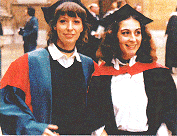 |
| With best friend Shaheen Bekhradnia at their graduation from Oxford University. |
She was brought up in Chiswick, west London, the daughter of
Jewish electrician, Reg, and a dancer, Doris, who'd left home to go on the
stage. "I have a bit of the performer in me. I went to dancing lessons at
four and was pretty crummy, but loved to dress up, make up and be in the
school play." She studied philosophy and psychology at Oxford, worked on
a kibbutz, researched in Paris for a year. "In those heady days - 1973 -
it was the start of neuroscience and I became fascinated."Her own expertise
is in Alzheimer's and Parkinson's and there is some grumbling among academics
that she set up, with others, a research and drug company, Synaptica, to
patent a novel use for a chemical in the brain. She has four per cent of
the equity, Oxford university owns 20 per cent and outside investors have
the rest. "I'm not a maverick. There's a new entrepreneurial culture. Oxford
has spun out at least nine companies in the last few years, which could provide
an income enabling them to stand free of government and to fund
scholarships."
Colleagues also criticise her for suggesting it is difficult
for a woman to have children as well as keeping abreast of a scientific career.
She has taken her own advice. At 40, she married Oxford's Professor
Peter Atkins, who wrote the world's bestselling
chemistry book, Physical Chemistry. ("Don't dare print his name wrong.
The Times called him Brian. Brian! Imagine! I'm always upset by
inaccuracies. They could have looked it up in Who's Who." She's there;
he isn't, but he's very relaxed about her high media profile.) "I didn't
think I'd marry. I stood on my own two feet, with a kernel of friends and
boyfriends as an optional extra. I didn't need a dashing prince and I certainly
didn't want to dress in white and be a fairy princess. I don't think I could
be described as an old-fashioned woman. I'm a lousy cook, and hate housework.
And then I met Peter, found a special relationship and the corollary was
that we married. "
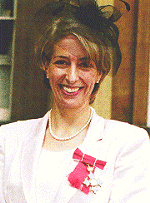 |
| Awarded a CBE by Prince Charles at Buckingham Palace,on 27 April 2000. |
We get up at five in the morning, seven days a week, lock ourselves
away working on Sunday, take our laptops on holiday - which we go on often,
in exotic places. I don't blush at that. We've earned it. I sometimes think,
as Keats said, 'Oh for a life of sensations rather than of thoughts,' but
if you're born with a thinking attitude, it won't go away. I wouldn't like
to be more carefree. I feel a strong sense of mortality, that I have only
one life and there's so much I want to do and discover." They have no children.
"I didn't wake one morning and decide not to. A negative decision like that
evolves. When I was 13, my parents had a son and it was horrible - smelly
nappies, sleepless nights for mum, loads of mess. It turned me off motherhood
- although my brother is a very nice person. Also, I never had that visceral,
gut-wrenching desire for babies I gather some women experience, and I married
a man who already had a daughter and made it clear he didn't want any more.
Maybe there are covert Freudian things as well. I sometimes wonder what it
would feel like to be pregnant. But I also wonder about bungee jumping. Some
women are fulfilled by having children, but if you sublimate your desires
to another individual - usually a man - it leads to frustration."
And brain-altering antidepressants prescribed by GPs? "Exactly,"
she says. "Look how many housewives were addicted to Librium for decades.
If you're in desperate pain, then opiates can relieve it, but that doesn't
mean you take morphine if you're a bit fed up. Will it help someone cope
with life by marinating their brain in Prozac? There's always a pay-off.
That's an example of manipulating the bricks, not the house. What happens
is the chemical causes a change in the configuration of the brain, in terms
we poorly understand, to alleviate depression. There might be other ways
of doing it - playing squash, being happy, laughing, dancing, having an orgasm.
We've developed this idea that we should always be happy and there is a solution
to everything. In earlier cultures you didn't expect to suffer a bereavement
and be happy the next day. It's sad if we reduce our repertoire of emotions
by taking a drug. We're getting into a culture where we escape problems,
rather than absorb them, sort them out and move on with life. Almost by
definition, we cannot change emotions, but we can manipulate them.In the
series, we show an interesting experiment where one group is told they've
been given amphetamines and a control group is not told. Those who know it's
an amphetamine say they feel happy and high. Those who don't feel anxious.
It shows the drug itself doesn't have the emotion
locked into it - more it reacts to your existing mind set."
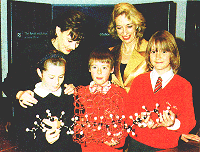 |
| Patron Cherie Booth helps her launch the RI's Heart of Science campaign in 1999. |
I wonder if she's ever taken drugs. "Not really. I tried a
joint in the sixties, but couldn't stand sitting in corners giggling. I'm
the manic type, who likes zapping around. I drink, but given I like to do
things in excess, I put very fierce rules on myself- never at lunch, never
by myself I used to smoke heavily and drank coffee perhaps every 20 minutes,
which is why I have mint tea now. I am so anti drugs. The big risk is you'll
change the person you are. Blowing your mind is exactly what you're doing.
I oppose the view that cannabis is OK. You need only 0.7mg - as opposed to
2,000mg of alcohol - to achieve an observable effect in the brain. People
don't realise that."
"Will it help someone cope by marinating their brain in Prozac? It's sad if we reduce our repertoire of emotions"
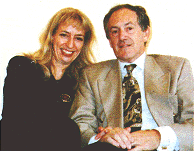 |
| She married Peter Atkins,a professor of chemistry at Oxford University,in 1991. |
Rapid biological and chemical discoveries mean, she says, we
are at a crossroads. We may soon be able to live a life of virtual reality.
'That would take away individuality and make you a sponge. I fear it, but
one way of alleviating that fear is to talk about it and make sure it doesn't
happen. We could have a restricted gene pool [if foetuses with the "wrong"
genes are aborted], a culture of competitiveness where everyone wants the
same, which would lead to a higher incidence of psychiatric disorders and
drug abuse because people are trying to escape distressing situations. There's
always someone cleverer, richer, fatter, thinner than you, so if you don't
enjoy being you and all the wonderful things you are, and compare yourself
with others, you'll be unhappy. Or we could have a world where we have huge
amounts of leisure to learn, think, create and try in improve the lot of
the less fortunate. Science has the technology to achieve all those ends
and it is a social issue, whether we channel it towards good or ill. I'd
hate to see people happy all the time, wrapped in drugs, sanitised against
the problems and worries of mankind. To expect fun every moment diminishes
the human condition. And you mustn't become sad about the inevitable
deterioration of the body. Your brain is your best bit. If you put your faith
in it, there's no reason you shouldn't enjoy yourself until you die."
WEBWATCH You can hear extracts from this interview at
www.radiotimes.com
| TOP BOFFIN BACK'S AMBITIOUS PLAN FOR SCIENCE COLLEGE STATUS |
School's bid for winning formula
A TOP scientist is backing a high school's bid to become a
science college. Baroness Susan Greenfield CBE has agreed to become patron
of Fairfield High School for Girls, which is aiming to become a science college
as part of the government's specialist schools initiative. This could bring
the school £500,000 over three years to pay for more books, equipment
and staff, but it needs to come up with 'match funding' of £50,000 by
March to make the next round of bidding for the cash. Baroness Greenfield
is director of the Royal Institution of Great Britain and professor of
pharmacology at Oxford University. |
A mind of her own
Susan Greenfield,pioneering guide to the brain,worries that new technology will limit our individuality.That can't be a problem for her reports Gail Vines
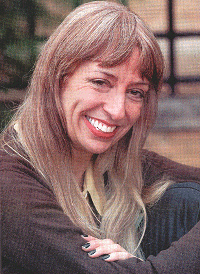 |
ALTHOUGH NOT quite a household name, perhaps, Susan Greenfield
is a star media boffin. She's one of a handful of British scientists who
seem to enjoy writing accessible books about science. Braving academic disdain,
she writes newspaper columns and presents TV documentaries as well. She has
even itemised the contents of her handbag at the behest of an inquiring
journalist. With a winning smile and quick-fire verbal agility; Greenfield
is at home in the celebrity jungle of media and politics.
This year the Daily Mail ranked her among its "100 most influential
women in Britain", while in 2000 The Observer voted her Woman of the
Year Two years ago, Tony Blair elevated her to the House of Lords: Baroness
Greenfleld. She's pro-GM food, by the way and against the decriminalisation
of cannabis. On a wide range of subjects, Susan Greenfield has no doubt of
her own mind.
Which brings us to the heart of her latest book, Tomorrow's People:how
21st century technonogy is changing the way we think and feel (Allen
Lane, £20). Fiction, albeit science fiction, was what she wanted to
write. One Christmas, on a quiet beach holiday in the Caribbean, she set
out to write a racy thriller a page turning novel featuring "a science-starlet",
"a brilliant and beautiful heroine, a female neuroscientist ..". Disarmingly,
Greenfield says she soon abandoned the attempt, judging her narrative pedestrian,
her characters cliched and her dialogue wooden. Meet this scientist and you
soon discover that self-revelation is Greenfield's secret weapon. Openness,
outspokenness and sheer self-belief can be highly attractive
characteristics.
So Tomorrow's People is, for its author the next best thing to fiction;
an imaginative leap into what the future might be, given a range of advances
in IT genetics, reproduction and nanotechnology futurology has its dangers,
though. Readers of this book must be willing to journey along the paths she
maps out, with signposts provided by her researcher Milla Harrison.
In Greenfield's vision, the future is peopled by a decidedly dreary lot.
They spend more time conversing with household appliances than with one another.
Their loos tell them how they're feeling; their fridges tell them what to
eat. At least washing machines are not in on the conversation, as clothes
clean themselves. (Bacteria embedded in the fabric eat the dirt.)
| SUSAN GREENFIELD BIOGRAPHY |
| BORN IN 1950 In London, the daughter of a dancer and an elertrician, Susan Greenfleld grew up in Chiswick, studied at St Hilda's College, Oxford, and took a DPhil in Oxford's Departmant of Pharmacology. In 1985, she was appointed university lecturer in synaptic pharmacology, and a fellow of Lincoln College, Oxford. In 1991 she married Professor Peter Atkins, the chemist and author of best-selling textoooks. She became a life peer in 2001. Since 1996, she has been professor of pharmacology, senior research fellow at Lincoln College, Oxford, and an honorary fellow at St Hilda's. At Oxford she heads a multi-disciplinary group researching brain mechanisms linked to neurodegeneration. Her company, BrainBoost Ltd, is developing non-pharmaceutical approaches to Alzheimer's disease. In 1995 she published her theory of consciousness, Journey to the Centres of the Mind, which she developed further in The Private Life of the Brain (2000). In 1994 she was the first woman to give the Royal Institution Christmas lectures, and in 1998 was appointed its director. Her TV series Brain Story was broadcast on BBC2 in 2000 and her new book, Tomorrow's People, appears from Allen Lane this week. |
Tomorrow's people reproduce via test tubes, eat GM food, and
go to work on the web. Illness and disability are well-nigh banished by designer
embryos, "neutraceutical" food designed to contain every nutrient known to
science, and miraculous medical interventions such as cyber-prostheses and
gene therapy.
But futuristic lifestyle scenarios are not really what interest Greenfield.
Instead, she's concerned about how this technology is changing the way we
think and feel. And no wonder. Most of the time, the denizens of her dystopia
are either stoned out of their minds or away with the cyber-fairies. They
should get out more, but of course in this hi-tech world there's no reason
to.
Forget wholesome walks in the country; nature doesn't feature. When I mention
this, Greenfield laughs and says that, "I am a Londoner I was born a Londoner
and I think I'm finally old enough and sufficiently confident to stand up
and say unflinchingly; I'm an urban person. I hate gardening and cooking,
but I love shopping, I love wine bars, the diversity and buzz of city life
and things to do."
But even metropolitan attractions are off the agenda for tomorrow's people.
Cybershopping satisfies every material desire, while cyber-sex does for the
rest. Even children are expected to bend genders and try every conceivable
orientation in virtual reality: "Hetero-, bi- and homosexual boundaries have
long been obsolete, as has the old concept of the family."
Yet it's not the prospect of sexual experimentation
or post-family life that worries Greenfield, but something else: what she
perceives as the threat to the private, solitary individual. In 2050, with
everyone wired to everyone else, individual identity has become submerged
within a vast public collective. Wittgensteinians
might argue that human subjectivity has never been coherently conceptualised
as a private affair, but Greenfield's stab at explaining consciousness, The
Private Life of the Brain, makes a virtue of distinctive inner worlds.
So the stakes are high.
In her universally IT-connected world, "we would no longer have private thoughts;
rather we would effectively be part of a larger network, a mere node in a
thinking, conscious system". With the loss of private thoughts, Greenfleld
believes, go creativity originality, and the wellsprings of human achievement.
The antidote to terrorism and fundamentalist cults, she says, is to foster
private lives. It's as though the solution to Osama bin Laden is suburbia.
If there's a whiff of Cold War rhetoric here, her intellectual stance probably
reflects more straightforwardly the robust mindset of a self-made woman.
She admires the radical individualism of the existentialists, and would most
like a time machine to take her back to Left-Bank Paris of the 1950s. The
daughter of a Jewish electrician and a Gentile dancer she says she has always
been aware that she doesn't fit easily into standard categories.
A working class child sent to an academic, middle-class school, and shored
up always by the unwavering support of her mother Susan won a place at Oxford
to read Greats, before switching to psychology. Now a businesswoman (a founding
director of BrainBoost Ltd), an Oxford don and director of the Royal
Institution, she can justifiably feel well-placed to advise on the secrets
of success. "Just be yourself" she tells first-year Oxford undergraduates
who are reeling from the discovery that they are no longer the brightest
in the class.
It's good advice, yet in some ways at odds with Greenfield's central message.
For although she speaks strongly of the importance of tolerance and openness
to difference, she doesn't really want everyone to do whatever they like.
Rather she wants them to be like her to improve themselves, to work hard,
to reach goals. Stark dualities run through her book: good vs bad; private
vs public; active vs passive; and something vs hedonism, though I'm not clear
what. "Achievement", says Greenfield, in a flash.
She's suspicious of happiness, of pleasure, unless it springs from improving
activity like writing books or healthful, physical activity (her mother's
daughter she herself loves dancing.) In her future-nightmare world, humanity
has sunk into sensation-seeking passivity lost in chemical oblivion or mindless
cyber-entertainment, living only for the pleasure of the moment.
If that's the threat from modern technology spelt out in Tomorrow's People
in vivid detail, the way to avoid it is less clear. She speaks genenally
of education, and of encouraging young people to greater personal achievement.
We have to work from the bottom up, she says. "Scientific literacy" is the
way forward, Greenfield insists.
Tomorrow's People criticises the Technophobe, the Tehnophile and the
Cynic. So what's a preferable stance? I ask. Should the ideal citizen be
a Technosceptic? "No," she says, "I think what we need is a techno-savvy
populace, who say now that we have this technology how can we use it, how
can we make the most of it?"
As an entrepreneur Greenfield does not warm to government regulation as a
restraint to technological excess. Instead, she advocates the formation of
a Science Peace Corps to develop technologies to tackle the plight of the
developing world: "the age-old issues of drought, flood, famine, infection,
corruption and contraception". Perhaps "By taking on stark reality" she says,
"we might be able to stave off the more alarming excesses of the new technologies
that could corrode our human individuality."
"The private ego is the most precious thing we each have," she argues, "and
it is far more vulnerable now than ever before." Being human is not a sufficient
safeguard; human nature is too malleable, too open to environmental influence.
Rather we need to design and plan a world, she says, in which the
individual is celebrated above all else.
Yet the author herself is ample proof that individuality is alive and kicking.
Why should someone who exudes such a sense of self -not even afraid to let
down her long blonde hair for the photographer in the Royal Institution's
poster - be so sure that the private ego is under siege? Could it be that
everyone else seems bland in comparison? If so, her next venture - three
months as Thinker in Residence in Adelaide - might just reassure her that
human individuality shows no signs of fading away just yet.
[The Independent Magazine prior to 27Sep 2003]
| Problem of Consciousness | Brain Tour | Machinery and Intelligence |
